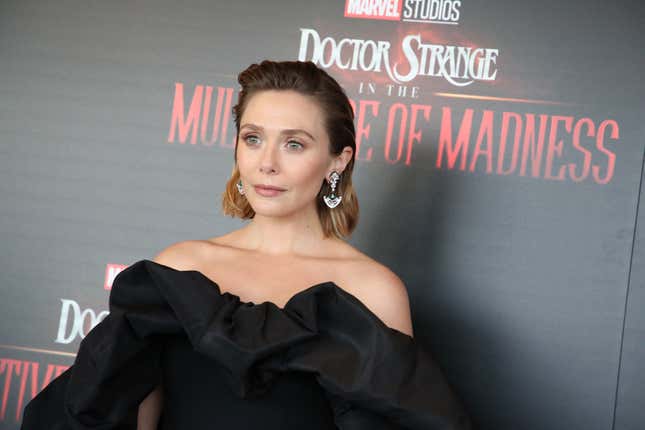
Celebs—they’re just like us, in that they, too, find snobby cinephiles deeply annoying. In a recent interview with The Independent, Elizabeth Olsen, the star of Dr. Strange in the Multiverse of Madness, admitted she “gets a little feisty” when it comes to defending Marvel Studios from some of the most tired critiques of it. Hard same!
As The Independent notes, some of those critiques include when director Martin Scorsese described MCU films as “closer to theme parks” than cinema, and The Godfather director Francis Ford Coppola called them “prototypes made over and over and over again to look different.” Also, last year, Dune director Denis Villeneuve similarly called Marvel movies “cut-and-paste” of one another and went so far as accusing them of turning audiences into “zombies.” And then, of course, there are the persistent Twitter memes that excoriate the films for being nothing but green screens and CGI.
Olsen, who’s played Wanda Maximoff AKA the Scarlet Witch since Avengers: Age of Ultron in 2015, told the outlet that critiques of Marvel movies that “make them seem like a lesser type of art” frustrate her because of the labor this erases. “I’m not saying we’re making indie art films, but I just think it takes away from our crew, which bugs me,” she said. “These are some of the most amazing set designers, costume designers, camera operators.”
I want to preface this by saying Marvel has a net worth of about $50 billion and doesn’t need me to defend it (not for free, at least!). But what always boggles my brain is that so many critics, social media users, and every Film Guy on Tinder seem convinced that Marvel should be making movies like Licorice Pizza, Lady Bird, or any other suburban A24 flick. Like… why?? People are already doing that, and you can watch those movies if you prefer! You don’t see me running my mouth criticizing the grossness of an indie film about a love story between a 25-year-old woman and 16-year-old boy, which, ew. Yet, it seems no one can pass up an opportunity to yuck my yum for enjoying a good CGI fight. Please, film nerds, just let me and my fellow Marvel dorks enjoy our three-hour spurts of repetitive explosions in PEACE!
“From an actor’s point of view, whatever, I get it; I totally understand that there’s a different kind of performance that’s happening,” Olsen added. “But I do think throwing Marvel under the bus takes away from the hundreds of very talented crew people. That’s where I get a little feisty about that.”
Olsen’s reason for defending Marvel Studios—that we shouldn’t devalue the labor and brilliance of the off-screen workers who make Marvel’s magic happen—is, of course, much more important than my very personal reasons. I have enough problems in my life; I want to eat popcorn and watch unreasonably attractive people in ridiculous costumes run dramatically in front of exploding, collapsing buildings without being made to feel guilty for it.
That said, Marvel movies have their issues, and I’ll be the first to admit this. The superhero genre often inevitably becomes copaganda—you can’t go five minutes watching a Batman movie without someone (usually Batman) uttering the accursed phrase, “law and order.” Marvel Studios itself consults with the US military, despite how literally every Marvel movie still makes them look useless. And while we’ve lately seen delightful progress on gender and representation in the MCU (hello Gemma Chan! hello Florence Pugh!), I’ll still never forgive Kevin Feige for throwing Natasha Romanoff off a cliff, ostensibly because her life as a single woman who couldn’t have kids was less valuable than that of some racist white guy who did have kids. If anyone wants to critique Marvel films, please consider any of those reasons instead of its penchant for repetition and spaceship blasts.
In any case, somehow, despite all of this, I love the intergalactic, utterly-removed-from-reality fight scenes; the zesty, dramatized one-liners; the universal—now multiversal—stakes of every plotline; and, unironically, above all, the superheroes themselves. They’re the reason you keep coming back to a franchise that’s been making these movies since Iron Man hit theaters in 2008. They’re why you (me, I did this) name your feisty little pit bull-chihuahua Bucky, after a particular emo, metal-armed smokeshow.
And I daresay that the popular critique that Marvel movies are void of meaningful plot or societal relevance is objectively false unless you’re determined to see them that way. Nearly every MCU Phase 4 project—or, in other words, the Disney+ shows and movies that have been released post Endgame—has dealt with mental health and the enduring, relatable impacts of trauma in some way; this was the focal point of WandaVision. Captain America: The Winter Soldier was arguably one big allegory for predictive policing and the consequences of living in a capitalist, surveillance state hellscape. Chloé Zhao’s Eternals quite literally revolved around the fundamental question of what it means to be human. And Black Widow was a story of women, whose bodies were reduced to a military general’s weapons, reclaiming their agency.
So, there you have it. All the “high-brow” Licorice Pizza nerds need to learn to live a little, or at the very least learn to let me live. Maybe I do “get a little feisty” when it comes to discussing Marvel movies, but hey, at least I’m in good company.